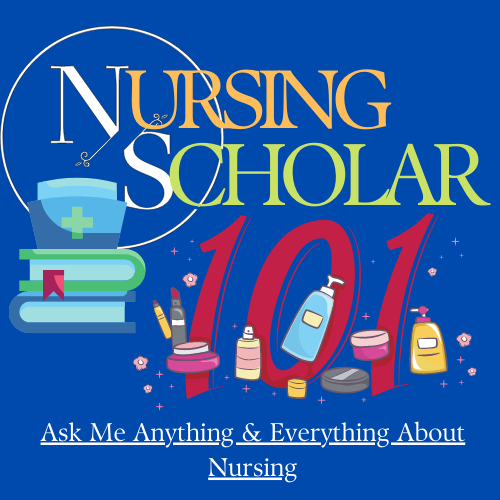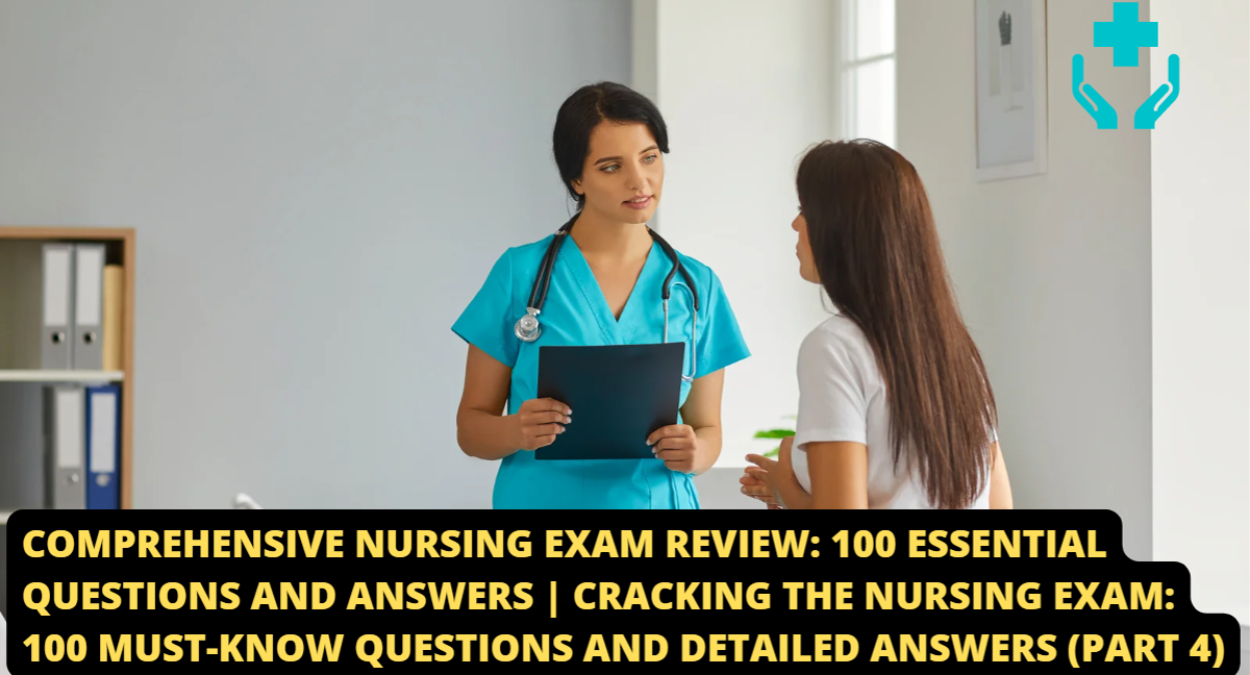Comprehensive Nursing Exam Review: 100 Essential Questions and Answers | Ace Your Nursing Exam: Key Questions and Expert Answers (Part 2)
Are you ready to take your nursing exam by storm and emerge victorious? Look no further! Welcome to our comprehensive nursing exam review, featuring 100 essential questions and expert answers that will help you ace your upcoming exam. We understand the challenges and pressures that come with preparing for a nursing exam, but fret not!
In this blog post, we have curated a collection of key questions that frequently appear on nursing exams, accompanied by detailed answers from experienced professionals in the field. So, fasten your seatbelts and get ready for an immersive learning experience that will sharpen your knowledge, boost your confidence, and set you on the path to success in your nursing career. Get ready to conquer your nursing exam with our extensive review!
Pharmacology
Pharmacology is a vital subject in nursing that focuses on the study of drugs, their actions, interactions, uses, and effects on the human body. It provides nurses with an understanding of the medications they administer to patients and their impact on various body systems. Studying pharmacology equips nurses with knowledge about drug classifications, mechanisms of action, therapeutic uses, side effects, and nursing implications. Nurses learn how medications are absorbed, distributed, metabolized, and eliminated from the body, as well as how to calculate dosages and administer drugs safely.
Pharmacology enables nurses to assess the appropriateness of medication orders, monitor patients for desired effects and adverse reactions, and provide patient education on medication use and adherence.
Understanding pharmacology is essential for nurses to ensure medication safety, prevent medication errors, and advocate for their patients’ well-being. It forms the foundation for pharmacotherapeutic decision-making and collaborative care with other healthcare professionals. By integrating pharmacological knowledge into their practice, nurses can optimize patient outcomes, promote medication safety, and contribute to the overall management of patients’ health conditions.
Overall, pharmacology is a crucial component of nursing education and practice, empowering nurses to provide safe, effective, and evidence-based medication management for their patients.
Here are the answers to the pharmacology and pathophysiology-related questions:
Here are the answers to the Pharmacology-related questions:
1. What is the difference between generic and brand name medications?
Generic medications and brand name medications differ in their names and manufacturers. Generic medications contain the same active ingredients as their brand name counterparts but are typically less expensive. Brand name medications are developed and marketed by pharmaceutical companies and often have a recognizable name.
2. What is the mechanism of action of beta-blockers?
Beta-blockers work by blocking the beta-adrenergic receptors, which are receptors for adrenaline and noradrenaline. By blocking these receptors, beta-blockers reduce the effects of these hormones, leading to decreased heart rate, decreased blood pressure, and reduced cardiac workload. They are commonly used in conditions such as hypertension, angina, and heart failure.
3. What are the common side effects of nonsteroidal anti-inflammatory drugs (NSAIDs)?
Common side effects of nonsteroidal anti-inflammatory drugs (NSAIDs) include gastrointestinal disturbances such as stomach pain, indigestion, and nausea. They can also cause gastric ulcers, increased risk of bleeding, and kidney problems. Other side effects may include headache, dizziness, and allergic reactions.
4. How do diuretics work in managing hypertension?
Diuretics work by increasing the excretion of water and electrolytes, primarily sodium, from the body through urine. By promoting diuresis, they reduce the volume of fluid in the blood vessels, leading to decreased blood pressure. This effect helps manage hypertension by reducing the overall fluid volume in the body.
5. What is the antidote for acetaminophen (paracetamol) overdose?
The antidote for acetaminophen (paracetamol) overdose is N-acetylcysteine (NAC). Acetaminophen overdose can cause liver damage, and NAC helps protect the liver by replenishing glutathione, a natural antioxidant.
6. What is the purpose of administering anticoagulants?
Anticoagulants are administered to prevent or treat blood clots. They work by interfering with the blood’s clotting mechanism, either by inhibiting the synthesis of clotting factors or by interfering with the function of clotting factors. Anticoagulants help prevent the formation of harmful blood clots, reducing the risk of conditions such as deep vein thrombosis, pulmonary embolism, and stroke.
7. What are the nursing implications for administering opioids?
Nursing implications for administering opioids include careful monitoring of vital signs, particularly respiratory rate, as opioids can cause respiratory depression. Assessing and managing pain levels, monitoring for side effects such as sedation and constipation, and providing patient education about medication use and potential risks are also important considerations.
8. What is the therapeutic use of bronchodilators in respiratory conditions?
Bronchodilators are medications used to relax and widen the airways in respiratory conditions such as asthma and chronic obstructive pulmonary disease (COPD). They work by relaxing the smooth muscles surrounding the airways, allowing improved airflow and relief of symptoms like wheezing and shortness of breath.
Pathophysiology
Pathophysiology is a vital subject in nursing that focuses on the study of how diseases and disorders disrupt the normal functioning of the human body. It explores the underlying mechanisms and processes that contribute to the development and progression of various health conditions. By studying pathophysiology, nurses gain a deep understanding of the changes that occur at the cellular, tissue, and organ levels when the body is affected by disease or injury.
Pathophysiology provides nurses with knowledge about the etiology (cause) of diseases, the pathogenesis (development) of specific conditions, and the manifestations and complications associated with these conditions. Nurses learn how different body systems are affected by diseases and how these alterations impact overall health and well-being. This understanding enables nurses to recognize signs and symptoms, interpret diagnostic test results, and provide appropriate nursing care based on the underlying pathophysiological processes.
By integrating pathophysiology into their practice, nurses can assess and monitor patients effectively, anticipate potential complications, and implement appropriate interventions to manage and prevent further deterioration of health. Pathophysiology knowledge also supports nurses in collaborating with other healthcare professionals in planning and implementing multidisciplinary care approaches.
Understanding pathophysiology is crucial for nurses to provide holistic, patient-centered care. It helps them to develop a comprehensive understanding of the disease processes, make informed clinical decisions, educate patients about their conditions, and contribute to effective disease management and prevention strategies. By incorporating pathophysiological knowledge into their practice, nurses can play a critical role in promoting optimal health outcomes for their patients.
Here are the answers to the pathophysiology-related questions:
1. What is the pathophysiology of asthma?
Asthma is a chronic inflammatory disorder of the airways characterized by bronchospasm, inflammation, and increased mucus production. Triggers such as allergens or irritants cause an immune response, resulting in the release of inflammatory mediators that cause the airways to become narrow, making breathing difficult.
2. How does diabetes mellitus affect the body?
Diabetes mellitus is a metabolic disorder characterized by high blood glucose levels due to inadequate insulin production (Type 1) or insulin resistance (Type 2). Insufficient insulin or insulin resistance prevents glucose from entering cells, leading to hyperglycemia. This can result in various complications affecting the eyes, kidneys, nerves, and cardiovascular system.
3. What are the manifestations of heart failure?
Heart failure occurs when the heart is unable to pump blood effectively, leading to inadequate perfusion of organs and tissues. Manifestations include shortness of breath, fatigue, fluid retention, edema, and decreased exercise tolerance. It can result from conditions such as hypertension, coronary artery disease, or damage to the heart muscle.
4. What are the risk factors for developing deep vein thrombosis (DVT)?
Risk factors for developing deep vein thrombosis (DVT) include immobility, recent surgery, pregnancy, hormone therapy, obesity, advanced age, and a history of blood clotting disorders. Other factors such as smoking, cancer, and prolonged sitting or travel can also increase the risk.
5. What happens during an inflammatory response?
During an inflammatory response, the body’s immune system activates to protect against injury or infection. It involves a complex cascade of events, including increased blood flow to the affected area, release of inflammatory mediators, recruitment of immune cells, and activation of the immune response to remove the pathogen or damaged tissue.
6. What are the pathophysiological changes in Alzheimer’s disease?
Alzheimer’s disease is characterized by the accumulation of beta-amyloid plaques and tau protein tangles in the brain, leading to progressive neuronal damage and cognitive decline. This results in memory loss, impaired thinking, and changes in behavior and personality.
7. How does cirrhosis affect liver function?
Cirrhosis is a late-stage liver disease characterized by the replacement of healthy liver tissue with scar tissue. It can result from chronic liver diseases such as hepatitis, alcoholism, or fatty liver disease. Cirrhosis impairs liver function, affecting processes such as detoxification, metabolism, and synthesis of proteins.
8. What are the stages of wound healing?
The stages of wound healing are:
a. Hemostasis: The body forms a clot to stop bleeding and initiates the inflammatory response.
b. Inflammation: Immune cells clean the wound, remove debris, and release growth factors to promote healing.
c. Proliferation: New tissue forms, blood vessels grow, and the wound begins to close.
d. Maturation: The wound remodels and gains strength as collagen fibers reorganize.
I hope these answers provide you with the information you were seeking. If you have any further questions, feel free to ask.
Medical-surgical nursing
Medical-surgical nursing is a specialized area of nursing that focuses on the care of adult patients with medical and surgical conditions. It encompasses a wide range of knowledge and skills required to provide comprehensive and holistic care to patients in various healthcare settings, including hospitals, clinics, and surgical centers.
In medical-surgical nursing, nurses are responsible for assessing, planning, implementing, and evaluating the nursing care of patients with acute and chronic illnesses. They collaborate with other healthcare professionals to manage and coordinate care, ensuring the physical, emotional, and psychosocial needs of patients are met.
Medical-surgical nurses are skilled in a variety of areas, including wound care, medication administration, pain management, monitoring vital signs, and patient education. They closely monitor patients’ conditions, recognize and respond to changes in health status, and intervene promptly to prevent complications.
Key areas of focus in medical-surgical nursing include preoperative and postoperative care, management of chronic illnesses, prevention and management of infections, pain management, and promotion of health and wellness. Medical-surgical nurses also play a vital role in patient and family education, providing information on disease processes, treatment options, and self-care strategies.
Medical-surgical nursing requires critical thinking, strong assessment skills, and the ability to prioritize and coordinate care for multiple patients. Nurses in this specialty must stay up-to-date with current evidence-based practices, as medical-surgical care continues to evolve with advancements in healthcare technology and treatment modalities.
Overall, medical-surgical nursing is a diverse and challenging field that requires nurses to possess a broad knowledge base and a compassionate approach to care. Medical-surgical nurses are essential members of the healthcare team, providing safe and effective care to patients across the lifespan and contributing to positive patient outcomes.
Here are the answers to the medical-surgical nursing-related questions:
1. What are the nursing priorities for a patient experiencing a myocardial infarction (heart attack)?
Nursing priorities for a patient experiencing a myocardial infarction (heart attack) include:
– Monitoring vital signs, particularly blood pressure and heart rate.
– Administering medications such as aspirin, nitroglycerin, and oxygen as prescribed.
– Assessing and managing chest pain or discomfort.
– Continuous cardiac monitoring and ECG monitoring.
– Providing emotional support and reassurance to the patient and their family.
– Educating the patient about lifestyle modifications, medications, and cardiac rehabilitation.
2. What are the common postoperative complications?
Common postoperative complications can include:
– Infection at the surgical site
– Pneumonia or other respiratory complications
– Deep vein thrombosis (DVT) and pulmonary embolism (PE)
– Wound dehiscence or evisceration
– Urinary retention or urinary tract infections
– Gastrointestinal complications such as ileus or constipation
– Fluid and electrolyte imbalances
– Pain and discomfort
– Adverse reactions to anesthesia or medications
3. How do you prevent deep vein thrombosis (DVT) in immobile patients?
To prevent deep vein thrombosis (DVT) in immobile patients, nursing interventions may include:
– Encouraging early mobilization and ambulation, if possible.
– Using sequential compression devices (SCDs) or intermittent pneumatic compression (IPC) devices.
– Administering prophylactic anticoagulant medications as prescribed.
– Educating the patient and family about the signs and symptoms of DVT and the importance of reporting any changes promptly.
4. What is the role of the nurse in caring for a patient with cancer?
The role of the nurse in caring for a patient with cancer includes:
– Providing physical care such as administering medications, managing symptoms, and assisting with treatments.
– Educating the patient and their family about the diagnosis, treatment options, and self-care measures.
– Monitoring and managing side effects of cancer treatments.
– Providing emotional support, counseling, and addressing psychosocial needs.
– Collaborating with the healthcare team to develop and implement a comprehensive care plan.
– Promoting patient advocacy and empowering the patient to actively participate in their care.
5. How do you manage pain in postoperative patients?
Managing pain in postoperative patients involves:
– Assessing the patient’s pain using a pain scale and considering their self-reported pain intensity.
– Administering analgesic medications as prescribed and evaluating their effectiveness.
– Using non-pharmacological pain management strategies such as positioning, relaxation techniques, and distraction.
– Monitoring for potential side effects of pain medications and adjusting the dose if necessary.
– Educating the patient about pain management strategies and the importance of reporting any changes in pain.
6. What are the nursing considerations for patients with gastrointestinal bleeding?
Nursing considerations for patients with gastrointestinal bleeding include:
– Monitoring vital signs, particularly blood pressure and heart rate.
– Assessing the severity and characteristics of the bleeding.
– Administering intravenous fluids and blood products as prescribed.
– Maintaining NPO (nothing by mouth) status as ordered.
– Monitoring laboratory values such as hemoglobin and coagulation profiles.
– Collaborating with the healthcare team to determine the underlying cause of the bleeding and provide appropriate interventions.
7. What is the significance of completing a preoperative checklist?
Completing a preoperative checklist is significant as it ensures patient safety and optimal outcomes. The checklist helps:
– Verify patient identity and confirm the correct surgical procedure and site.
– Ensure that all necessary preoperative assessments, tests, and documentation have been completed.
– Review and confirm any allergies, medications, and special requirements.
– Assess and address any potential risks or complications.
– Promote effective communication and collaboration among the surgical team members.
8. How do you prevent surgical site infections?
To prevent surgical site infections, nursing interventions may include:
– Maintaining strict aseptic technique during the surgical procedure.
– Administering prophylactic antibiotics as prescribed and ensuring proper timing and dosage.
– Preparing the surgical site with appropriate antiseptic solutions.
– Monitoring and managing wound dressings, drains, and surgical incisions.
– Educating the patient and family about wound care and signs of infection.
– Implementing infection control measures such as hand hygiene, proper disposal of contaminated materials, and environmental cleanliness.
I hope these answers provide you with the information you were seeking. If you have any further questions, feel free to ask.
In conclusion,
The blog post “Comprehensive Nursing Exam Review: 100 Essential Questions and Answers | Ace Your Nursing Exam: Key Questions and Expert Answers” serves as an invaluable resource for nursing students and professionals preparing for their exams. By providing a comprehensive collection of key questions and expert answers, this review equips individuals with the knowledge and confidence needed to excel in their nursing exams.
The carefully curated questions cover a wide range of topics, ensuring that all important areas of nursing knowledge are addressed. The accompanying expert answers not only provide accurate information but also offer insights and explanations that aid in understanding the underlying concepts.
By engaging with this comprehensive review, nursing students and professionals can deepen their understanding, enhance their critical thinking skills, and improve their ability to apply knowledge in real-world scenarios. The resource serves as a valuable study tool, enabling individuals to identify their strengths and areas that require further attention.
Success in nursing exams requires dedicated preparation, consistent effort, and a solid grasp of the subject matter. With the comprehensive review provided in this blog post, individuals have access to a wealth of essential questions and expert answers that will empower them to approach their exams with confidence and achieve the results they desire.
So, harness the power of this comprehensive nursing exam review, invest time and effort in studying the questions and answers, and stay committed to your exam preparation journey. Remember, with determination and the right resources, you have the ability to conquer your nursing exams and embark on a successful career in the nursing profession. Best of luck!
https://www.topuniversities.com/courses/nursing/10-study-tips-will-make-nursing-school-easier
- Comprehensive Nursing Exam Review: 100 Essential Questions and Answers | Mastering Your Nursing Exam: 100 Essential Questions and Answers (Part 1)
- All India Nursing Exam: 60 Plus Common Questions and Answers For Better Result (Part 1)
- The Fascinating World of Human Physiology: Exploring the Intricacies of the Human Body (Part 2)
- 50 Questions And Answers-Anatomy and Physiology: Exploring the Human Body’s Structure and Functions





